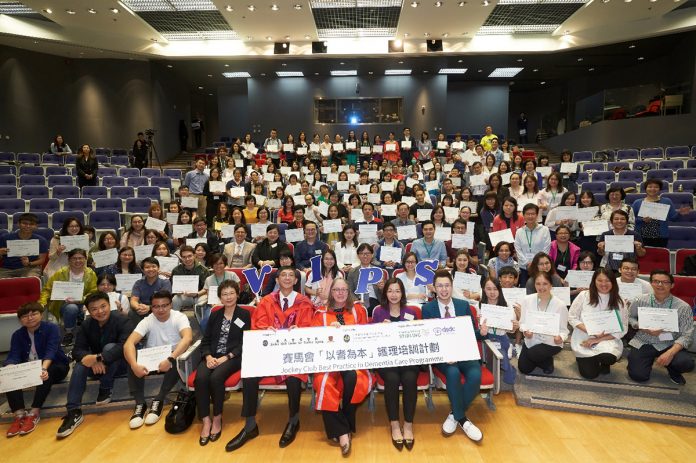Here, experts explain the intricate situation of Dementia care in Hong Kong, and why it could benefit from a train-the-trainer approach
Helen Chan1, Kenny Chui2, Florence Ho2, Eunice Hui2, Bel Wong2, Alison Bowes3, Timothy Kwok2
1The Nethersole School of Nursing, Faculty of Medicine, The Chinese University of Hong Kong, 2Jockey Club Centre for Positive Ageing, Hong Kong, 3Dementia Services Development Centre, University of Stirling
Providing care for people with dementia and their family carers is at the top of the policy agenda in ageing societies because this disease is one of the major causes of dependency and disability among older adults. Approximately 50 million people lived with dementia worldwide, and the prevalence is expected to surge continuously at a rate of nearly 10 million new cases every year (World Health Organization, 2019). Although a range of care services has been developed to meet their complex care needs, the care competence of staff members, who play a key role in the quality of care, is gaining considerable attention. Literature has consistently advocated the importance of training and empowerment in preparing the staff in dementia care (Figueiredo, Barbosa, Cruz, Marques, & Sousa, 2013; Surr & Gates, 2017; Tsaroucha, Benbow, Kingston, & LeMesurier, 2011).
Hong Kong is facing a rising demand for dementia care due to the ageing population. A local survey revealed that dementia care is a challenging issue for staff in long-term care settings (Lee, Hui, Kng, & Auyeung, 2013). The recently released Mental Health Review Report by the Food and Health Bureau of the HKSAR government (2017) highlighted the need for capacity building and workforce training to ensure the quality of dementia care. However, relevant training is limited to long-term care and residential care services, and most of the attention is focused on disease knowledge and skills in handling the challenging behaviours of people with dementia. Although a more structured training programme was recently developed for health and social care staff in community care settings to support the newly launched Dementia Community Support Scheme, the training is limited to staff members who are directly involved in the service. Systematic reviews on studies on dementia care training concluded that didactic teaching and task-oriented activities on occasional sessions demonstrate limited efficacy on staff care competence, especially on the staff’s attitudinal change (Spector, Revolta, & Orrell, 2016; Surr & Gates, 2017).
To address the urgent and extensive staff training needs in dementia care in Hong Kong, the Jockey Club Centre for Positive Ageing (JCCPA) launched a three-year Best Practice in Dementia Care Programme between 2016 and 2019 in collaboration with the Dementia Services Development Centre (DSDC) of the University of Stirling, UK. This programme has been widely adopted in the UK and other European countries over the past decade (DSDC, 2019). In the present project, this community-wide programme reached approximately 1,500 staff members from over 70 local non-government organisations, including community and day care centres, residential care homes for the elderly and outreach teams in Hong Kong. Initially, 17 experienced care professionals in elderly care services received training from the DSDC. These trainers then conducted training for 218 care professionals who committed to be facilitators in their own care settings or services to provide in-service training to colleagues. This training aimed to equip the facilitators with knowledge and proper caring attitude towards people with dementia as well as empower them with skills to provide guidance to their colleagues in their workplaces.
To ensure holistic care, the programme structure covered six domains: (i) dementia and persons with dementia; (ii) person-centred care and building meaningful relationship; (iii) communication and behaviours; (iv) support for people with dementia, family and carers; (v) health and wellbeing; and (vi) legal aspects and issues related to dementia. The domains were introduced on a monthly basis for six months. Two sets of training kits, including a facilitator guide, an introductory booklet and six booklets for each domain, were respectively developed for the residential and community care services. The training materials were adapted to the socio-cultural context of the local communities and translated to Chinese to facilitate self-directed learning.
The Train-the-Trainer approach, which is the key feature of the aforementioned training, increased the programme’s reach and sustainability. The facilitators acted as a change agent in their own care environments by providing on-site trainings. This approach empowers the facilitators and learners to link their new knowledge to real examples, familiar to them in their current work and co-constructs their learning experiences. Various interactive strategies, such as sharing, case discussion, role play, reflection and debriefing, were adopted to promote situated learning. In addition, the programme adopts an inclusive approach, in which all staff members in the care settings – not only those involved in the direct care of people with dementia – were invited to be learners. Stigmatisation and misunderstanding about dementia exist in this society, and this programme aims to raise the awareness towards dementia among non-care-related staff. The inclusion of all staff members in the training laid an important foundation in cultivating an atmosphere of caring and mutual understanding in the care settings.
To our best knowledge, this programme is the largest project amongst the Chinese communities to build staff capacity for dementia care across aged care services through a systematic and extensive manner. A mixed-method study was conducted to evaluate the effects of the training programme. The findings provided evidence that the improvement amongst learners throughout this three-year programme was not merely based on their knowledge related to dementia but also on the staff’s attitude and sense of competence in dementia care. The reflective essay submitted at the end of the programme reveals that the learners gained an enhanced understanding of the behaviours and emotions of people with dementia. Over time, the care staff developed confidence in communicating with their clients or tailoring activities based on a person-centred care philosophy. The staff also achieved improvements in their collegial relationship and teamwork through regular peer learning activities embedded in the training. The experiences from this project suggested that the Train-the-Trainer approach connotes the need for organisational support for change. Therefore, the approach is an effective strategy for transferring knowledge and skills to different staff levels, fostering a positive care culture and enhancing the sustainability of change in the organisation.
Acknowledgements: This project was supported by The Hong Kong Jockey Club Charities Trust.
References
Dementia Services Development Centre. (2019). Best Practice in Dementia Care Learning Programme. Retrieved from https://dementia.stir.ac.uk/education/flagship-courses/best-practice-learning-programme
Figueiredo, D., Barbosa, A., Cruz, J., Marques, A., & Sousa, L. (2013). Empowering staff in dementia long-term care: towards a more supportive approach to interventions. Educational Gerontology, 39(6), 413-427.
Food and Health Bureau, HKSAR (2017). Mental Health Review Report. Retrieved from https://www.fhb.gov.hk/download/press_and_publications/otherinfo/180500_mhr/e_mhr_full_report.pdf
Lee, J., Hui, E., Kng, C., & Auyeung, T. W. (2013). Attitudes of long-term care staff toward dementia and their related factors. International Psychogeriatrics, 25(1), 140-147.
Spector, A., Revolta, C. & Orrell, M. (2016). The impact of staff training on staff outcomes in dementia care: a systematic review. International Journal of Geriatric Psychiatry, 31, 1172–1187.
Surr, C. A. & Gates, C. (2017). Effective Dementia Education and Training for the Health and Social Care Workforce: A Systematic Review of the Literature. Review of Educational Research, 87(5), 966–1002.
Tsaroucha, A., Benbow, S. M., Kingston, P. & LeMesurier, N. (2013). Dementia skills for all: A core competency framework for the workforce in the United Kingdom. Dementia, 12, 29–44.
World Health Organization. (2019). Dementia. Retrieved from https://www.who.int/news-room/fact-sheets/detail/dementia
Please note: This is a commercial profile











